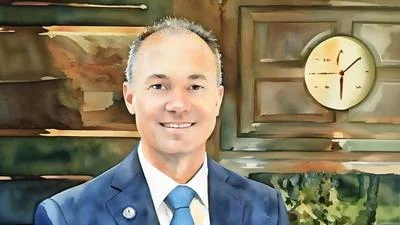David Kappos is a partner at Cravath, Swaine and Moore. He is also the former undersecretary for intellectual property at the US Department of Commerce and former head of the US Patent and Trademark Office.
Federal Newswire
How does intellectual property relate to innovation and prosperity?
David Kappos
We're living in a knowledge economy. We're living in an innovation-driven economy. [Whether it is] artificial intelligence, quantum computing, mobile telecommunications, 5G and 6G and beyond, self-driving cars, it's innovation driven. Eighty-five percent of the value of the S&P 500 is in [these] “intangibles.”
That's a reversal from the mid 1980s, when 85% of corporate value was in tangibles. That's a way of saying innovation is where the action is. It drives value, it drives job creation, it drives economic outcomes, it drives national leadership, it drives global leadership. It's all underpinned by a strong and effective intellectual property system.
That's the ability of the government to grant and enforce patents and trademarks for brands and copyrights, for works of art and authorship, and of course, trade secrets, protecting things like recipes and customer lists that are best kept secret.
Federal Newswire
Why is it important that individuals are able to invest in their own ideas?
David Kappos
[The] famous commentator, Jeremy Bentham of the UK, pithily wrote: “He who has no hope of reaping rewards will have no reason to sow seeds.” It's as simple as that. Without a strong and effective intellectual property system, most creativity is appropriable by everyone and anyone else.
Where ideas, creativity, even land, is appropriable by someone else, nobody will invest in it. Intellectual property. Abraham Lincoln said the patent system brought the fuel of interest to the fire of genius. It's intellectual property that enables investment in ideas.
Federal Newswire
Have you always been interested in intellectual property law?
David Kappos
I was [interested] from the beginning. I started out as an electrical and computer engineer and was designing cash modules in mainframe computers for IBM in the 1980s. It was then that I learned that a brand new court had been created in 1982 called the Court of Appeals for the Federal Circuit that was going to hear all patent appeals.
My brother-in-law…who was a young law student at Pepperdine University [said]. “maybe you should think about going to law school, because it looks like there's going to be a future in a strong and effective patent system brought on by the federal circuit.”
Federal Newswire
What is the importance of the Bayh–Dole Act of 1980?
David Kappos
It was a watershed moment between the creation of the federal circuit and then the passage of the bipartisan Bayh-Dole Act. It simply enabled universities, research labs, and small companies to take title to the inventions that they created using federal funding.
Those nonprofits and universities and labs and small companies could take title, and could go to their boards and their investors and recommend investment to take great federally-funded research and bring it into the marketplace as products and services.
The Bayh-Dole Act was absolutely groundbreaking. It turned the notion of federally funded research, and its ability to drive products and services in the marketplace, from a total failure...into a huge national success. So much so that many other countries have copied the Bayh-Dole Act. They have their own versions of it. It's been heralded as possibly the most important business legislation of the entire 20th century.
Federal Newswire
How does this work in the pharmaceutical industry, for example?
David Kappos
The federal government, to its great credit, funds billions of dollars of what's called upstream basic innovation. [This] goes to some of the national labs, [to] scientists at places like the National Institutes for Health (NIH), National Science Foundation, etc. [It] also goes to many universities and research institutions to do basic research, and that basic research frequently results in the discovery of possible new drug candidates.
This is a long way from saving people's lives or being safe and efficacious and approved by the FDA. But it turns out that a few million dollars in many cases of that early federal funding can enable a university, for example, to produce a possible drug candidate. Because the university gets to own the patent, [it can] then license the patent exclusively to a for-profit company.
Frequently that midstream research company creates more IP all on its own dime and may spend upwards of a half-billion dollars. You've got a few million dollars in federal funded research that's leveraged into much more private sector research and development. Then, finally, that company licenses what it's done down to a research biopharma company that's got the arms and legs to get into the marketplace and invest more billions of dollars to a total of perhaps $1-3 billion.
Federal Newswire
What portion of the profit goes back to the universities?
David Kappos
They always have milestone payments to the universities that will start when various events occur. They will be small at first, maybe hundreds of thousands or a few million dollars. But they escalate to tens of millions of dollars and hundreds of millions of dollars.
On the back end, if and when a product gets introduced, there will be a running royalty that will frequently escalate from 3 to 5 to 7 to 9%. It is not uncommon that universities make, in aggregate, hundreds of millions or billions of dollars from their research. It all gets plowed back into new labs, new equipment, new endowed chairs, which produces more innovation. It's a huge virtuous cycle.
Federal Newswire
What is March-in and how does that play into all of this?
David Kappos
In the original Bayh-Dole Act, there was a safety net provided. It is called the March-in right. It says that in unusual circumstances, if the university that received... federal funding fails to make progress toward commercialization and fails to put in reasonable effort at doing something with the IP, then the federal government can march in and license to a third party. That was a backstop.
As a result, the universities all build extensive mechanics into their licenses that they grant downstream. They require the next company and then the next company after it to exercise reasonable efforts to move a product forward, or the university can itself take the license back and give it to another party.
Federal Newswire
Can you explain the recent controversy over this issue?
David Kappos
Very unfortunately, a [recent] proposal invites, and in fact, mandates the federal government to march in under circumstances that are extremely broad, and that were not only never intended, but expressly excluded from the Bayh-Dole Act. For instance, price was expressly excluded from the Bayh-Dole Act on the basis that the market should set price and federal bureaucrats should absolutely not be interdicting in setting prices.
If this proposal goes through, we are going to have federal bureaucrats setting prices on products and services that result from federally funded research.
The reason it will not work is because… even if you now have the federal government able to march in and take away patent rights to the universities, it hurts the universities but will not change the price because most of the IP isn't under the Bayh-Dole Act.
[This will] create chaos and starve off funding because companies will not want...to invest. [It will] hurt universities by taking away their funding and you won't actually solve the problem.
Federal Newswire
What is the impact of the proposal on historically black colleges and small universities?
David Kappos
I have already run into a situation with a small college that was offered federal money. The agency built in language that mirrors what will be in the regulation. I told the university, if you accept this money, probably nothing is going to happen with the research because no for-profit company or their board or their investors are going to permit them to take the license when it has got [this] provision.
Federal Newswire
Why is this issue so important?
David Kappos
This is a national competitiveness issue. It is an innovation incentive issue. It is a national leadership issue. Our international competitors are absolutely salivating–starting with the People's Republic of China–at the prospect of US government funded R&D not getting implemented in the US because that's just sitting out there.









